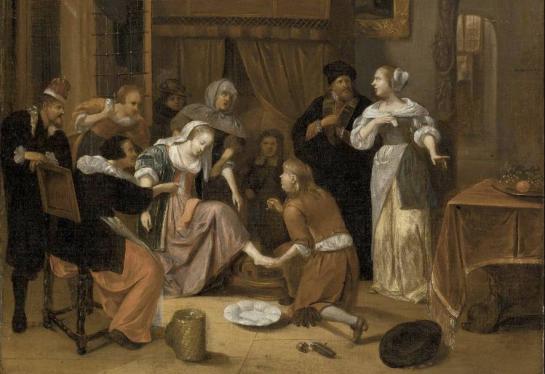
Call for Papers
Vragenlijsten in de geschiedenis van gezondheid en geneeskunde
Internationale workshop
19-20 februari 2026, Vrije Universiteit Brussel
Deadline voor het indienen van abstracts: 15 september 2025
We are delighted to announce a call for papers for a workshop focused on the historical use of questionnaires in the empirical fieldwork of health practitioners. Today, public health agencies routinely employ questionnaires in large population surveys to assess health trends at local, national, and global levels (e.g., the World Health Survey Plus). This workshop aims to historicize how various actors—public health officials, physicians, patients, and local residents—contributed to the development of health and medical questionnaires. This call invites scholars to examine the paper-based technologies and field methods historically used to collect and analyze data, such as house visits, field observations, and correspondence with patients. Central to the discussion will be the epistemic traditions that informed the development of questionnaires.
Today’s population surveys typically involve personalized interviews with a randomly selected sample from a target population. In this narrow sense, health surveys gained prominence in the 1930s (Johnson 2014, 5). However, if we adopt a broader definition of surveys (or enquêtes) as “one-time or regular observations on site using various instruments” (Herrnstadt and Renard 2025), we can trace historical precedents well into the early modern period.
While historians have addressed questionnaires in a general way (Midena and Yeo 2022), and highlighted their use as tools for standardizing clinical case reports (Mendelsohn and Hess 2010), questionnaires are by and large not considered key tools in the construction of health knowledge. This perception may stem from the dominant view that medical research has primarily developed in the context of laboratories and clinics.
Extending the existing scholarship, this workshop invites contributions that examine the materials, methods, and techniques used by medical practitioners to conduct field-based research through questionnaires. We are particularly interested in how practitioners entered real-world settings—visiting homes, factories or schools, reaching out to potential participants by mail, engaging with communities, or speaking with experts—to gather empirical data. Submissions should reflect on how questionnaire categories and conventions were constructed and/or challenged, as well as to what extent they supported or resisted quantification and standardization. We also welcome papers that explore the use of questionnaires alongside other observational tools, such as field notes, interviews, photographs, and sketches, in the production of medical knowledge.
The workshop will also critically examine how hierarchies and prejudices along racial, class-based, and gendered lines influenced the development of questionnaires. We invite reflection on how political assumptions shaped the selection of populations, the framing of questions, and the interpretation of data. Further, we seek to explore whether these methodologies aimed to address the complex, intersectional dimensions of health, including social, racial, and gendered factors.
Key questions we seek to address include but are not limited to:
How did health and medical practitioners design, distribute, and evaluate their questionnaires?
- How did they identify, recruit, and persuade suitable interviewees?
- What strategies did they use to conduct interviews?
- What tools of field observation did they employ?
- How was data aggregation, and compilation facilitated?
- How did health actors process and analyze the data?
- How did ideological views and cultural hierarchies inform the collecting and processing of data?
- How did health actors access and utilize administrative records to supplement their findings?
What role did diagrammatic, graphic or, more generally visual representation play in the processing of medical questionnaires?
The workshop will be organized by Jolien Gijbels (Vrije Universiteit Brussel) and Stephan Strunz (Technische Universität Dresden) and will be held at Vrije Universiteit Brussel on 19-20 February 2026.
The workshop will be facilitated by discussing pre-circulated papers. The workshop language will be English. Accommodation costs for all selected participants will be covered. We might have to ask participants to arrange and fund their own travel to Brussels, but we hope to be able to cover the travel costs of the participants. To this end, we will be applying for additional funding in the coming months.
Please send your abstract (max. 300 words) and a short biographical note (max. 100 words) by 15 September to Jolien Gijbels (jolien.gijbels@vub.be) and Stephan Strunz (stephan.strunz@tu-dresden.de).
Applicants will be notified by October 1st . The deadline for the submission of the pre-circulated papers is 5 February 2025.
References
Delmaire, Léa, Pierre Nobi, and Paul-Arthur Tortosa. 2021. “Enquêtes médicales (xixe-xxie siècle).” Histoire, médecine et santé 19: 9–21.
Herrnstadt, Martin, and Léa Renard. 2025. “Cultures globales de l’enquête.” À propos, no. 1. https://doi.org/10.57086/apropos.81.
Hess, Volker, and J. Andrew Mendelsohn. 2010. “Case and Series. Medical Knowledge and Paper Technologies, 1600-1900.” History of Science 48 (3-4), 287-314.
Johnson, Timothy. 2014. Health Survey Methods: Wiley.
Midena, Daniel and Richard Yeo. 2022. “Towards a History of the Questionnaire.” Intellectual History Review 22 (3), 503-529.
